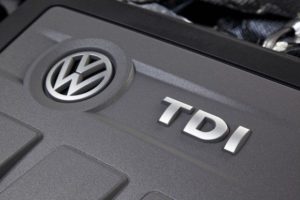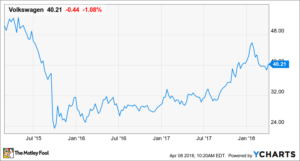Ford Motor Company (NYSE: F) said on Friday that it will recall about 347,000 2018 model-year pickups and SUVs to fix a transmission problem that could cause the vehicle to roll away when the transmission is in park.
That sounds like a big deal, doesn’t it? If you own one of the affected vehicles, it is a big deal — in the sense that you’d best get it fixed. (It won’t cost you anything except some time.)
But for investors in automakers, not every recall is a big deal. Some are very important because they can have a significant impact on the company’s bottom line or stock price. But many aren’t — even if the defect sounds serious, it may be no big deal in terms of its impact.
How do you tell the difference? I’m glad you asked.

Ford said that it’s recalling 347,000 vehicles, including some 2018 F-150 pickups, for a defect that could cause parked vehicles to roll away. Image source: Ford Motor Company.
Why automotive recalls happen
First, some background. Automakers issue recalls when they learn of a defect that could be dangerous, that could cause the vehicle to behave in illegal ways, or both. “Defect” here is a technical term: It can mean anything from a part that was installed incorrectly on a few cars to a significant design flaw affecting millions of vehicles. Automakers are obliged to repair such defects at no cost to consumers; that’s when a recall is issued.
Often, the danger is hypothetical: There haven’t been any accidents or injuries as a result, but the automaker (or regulators or both) are concerned that there could be, and so a repair is needed.
But sometimes, the danger isn’t just hypothetical. There may have been accidents, injuries, or even deaths that happened as a result of the defect. Or it may be clear from testing that the car does something illegal under certain circumstances, such as emitting more pollution than is allowed by law.
Either way, while most recalls aren’t serious, it’s important to remember that every automaker issues them from time to time. Even Tesla (NASDAQ: TSLA) and Ferrari (NYSE: RACE) have had recalls, and both will almost certainly have more.
How to tell when a recall is a big deal
Auto investors should pay close attention to recalls when there’s a significant chance that the recall will affect the bottom line, the company’s stock price, or both. Generally speaking, there’s a significant financial risk to the automaker when one or more of these things are true:
- There are known instances in which the defect led to injuries or deaths, or it becomes clear that the defect endangered many people.
- The defect is expensive to repair, requiring new parts, several hours of work by mechanics, or both.
- There are lots of vehicles (think millions) with the defect.
- The company knew about the defect for a long time before it was disclosed.
It’s always a big deal when there are injuries or deaths, of course. That’s not only because of direct concern for the people affected, but because the automaker could suffer lingering damage to its reputation (and its sales) if the situation isn’t handled very, very carefully.

Even if it’s handled carefully, such a situation might still be costly: General Motors (NYSE: GM) spent roughly $4 billion to deal with its 2014 ignition-switch scandal. But CEO Mary Barra showed concern for victims, accepted responsibility, didn’t contest criminal penalties, and went above and beyond in recalling vehicles that had any chance of being affected. Her response successfully limited the long-term damage to GM’s reputation. The bill was steep, and the company’s sales (and its stock price) took hits, but recovered.
It’s also a big deal if the defect is expensive to repair. Last year, Ford recalled 440,000 vehicles for door-latch and engine-cooling problems. That’s not a huge number of vehicles as recalls go, but both defects required Ford to have new parts made and shipped to dealers and to pay the dealers for complicated, time-intensive repairs. The total cost was $295 million, a non-trivial dent in Ford’s quarterly bottom line.
Even if the defect is fairly minor and inexpensive to fix, a recall can be a big deal if there are several million vehicles affected — simply because several million people will hear about it and may not be happy. And of course, it’s never good for a company’s reputation or sales if it’s revealed that the company knew about the defect for a long time before taking action.
The perfect recall storm: VW’s diesel scandal
Imagine a defect that created a significant public-health hazard, was very expensive to repair, and affected millions of vehicles all over the world. In addition, the company knew it about and concealed it for years. Not only might that company get socked with a huge bill for the repairs, but it also might find itself facing huge lawsuits, damaging adverse publicity, and even criminal charges.

You don’t have to imagine it: That’s what happened to Volkswagen AG (NASDAQOTH: VLKAY) in the wake of revelations that millions of its vehicles had been programmed to cheat on emissions testing, including about 500,000 in the U.S. The revelations — which were made by U.S. regulators, not by VW itself — led to a perfect recall storm:
- The toxic emissions were a clear public-health hazard and in flagrant violation of the U.S. Clean Air Act, which strictly regulates emissions of oxides of nitrogen. These oxides cause smog and acid rain and are especially plentiful with diesel engines. (Other countries regulate them less strictly.)
- The repairs required to bring the vehicles into compliance with U.S. laws were so expensive that VW ended up buying most of them back.
- While VW suffered the worst consequences in the U.S., where laws regulating diesel emissions are very strict, it also faced and continues to face investigations and legal consequences in several other countries, including Germany.
- Not only did VW know about the defect, it had deliberately designed the vehicles to cheat.
The upshot: Since that first revelation in September of 2015, the mess has cost VW about $30 billion, and there still may be more charges to come. And investors, take note: VW’s stock price still hasn’t recovered.

VLKAY data by YCharts.
Is Ford’s latest recall a big deal?
Now, let’s go back to the beginning: Is Ford’s latest recall a big deal? Let’s run down our four points:
- Injuries or deaths? Ford said that it’s aware of one accident and injury related to the defect.
- Expensive to fix? The defect isn’t a design flaw, it’s an assembly error: A clip on the vehicle’s transmission-gear-shift cable might have been installed incorrectly at the factory. The repair is simple and doesn’t require new parts to be made.
- Lots of vehicles? The affected models include Ford’s best-selling F-Series pickups, but the numbers aren’t huge: About 347,000.
- Did Ford hide the defect? On the contrary: Given that the affected vehicles are all 2018 model-year F-Series trucks and Expedition SUVs, it looks like Ford reacted promptly after discovering the problem.
Long story short: It’s a big deal for the person who was injured, and we shouldn’t trivialize that. But in terms of the impact on Ford’s bottom line or stock price, this recall doesn’t look like a big deal as of now.


